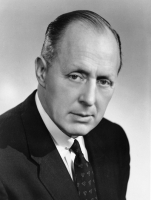

Year Born: 1903
Year Died: 1990
Pioneer
Caple, Kenneth (1903-1990)
Regularly-scheduled broadcasts for schools were first heard in British Columbia in 1936, when the forward-thinking Okanagan Valley Teachers’ Association aired a series of six programs on music appreciation over CKOV-AM in Kelowna. Carlyle Clay, a teacher from Armstrong B.C., had brought the proposal to the OVTA, and its then president, Kenneth Caple, who strongly believed that radio should be used to expand the education and knowledge of youth in the school system, found the funds necessary to get this experiment on the air.
Kenneth was born in Vancouver in 1903, and started teaching in Cloverdale in 1925. He went to UBC, where he showed a natural talent for acting in many roles with the drama group, and this experience was to prove valuable later in his broadcasting career. He graduated from UBC with a degree in Science in Agriculture (BSA) in 1926, and gained his MSA in 1927; he quickly became recognized as a teacher with exceptional vision and imagination, and was destined to gain a lasting reputation as a pioneer in the field of Canadian schools Kenneth Caple with Oenone Baillie in a UBC drama production of “You & I” broadcasting. The success of those early broadcasts resulted in a Committee For Radio in Schools being formed in 1937, and after further experiments in schools programming had taken place in B.C. over the next few years, involving the CBC and several B.C. radio stations, the Department of Education decided schools broadcasting was worth a significant financial commitment.
In 1940 Kenneth Caple, who at the time was principal of a high school in Summerland, was appointed by CBC’s Regional Director Ira Dilworth as the province’s first Director of Schools Broadcasts, with an office in the CBC building. After utilizing a $5000 Carnegie Corporation grant to familiarize himself with how schools broadcasting was working in the United States, Kenneth worked with teachers across the province to establish such things as the ideal length for schools programs (20 minutes for senior grades, 15 minutes for elementary pupils), their timing, and what teachers’ aids should be distributed in support of the broadcast material. This extensive research was to pay major dividends in getting support from faculties across the province for this new way of broadening the scope of student education.
His vision was to expand the student vocabulary with practical knowledge and to aid teachers in an already bursting rural classroom. He introduced programs such as “The Mighty Fraser,” a series based on the vast Fraser River and the many adventures that happened on and around its waters, as well as “The Great Wonderers,” a science-based broadcast introducing such eminent scientists as Galileo, Newton, and Archimedes to its young listeners. He also implemented several farm broadcasts, complete with agricultural information, agricultural economic news, and dramatizations of agricultural problems based on the life of the average farm family. One of his series, “Working Together in Tukwila Valley”, devised to encourage schools to develop their own curricular projects, was so successful that the National Film Board used it as the basis of a film. Also, as the province’s representative on the National Advisory Council on School Broadcasting, he was responsible for devising several national school series in 1943-44 with appropriately democratic themes for wartime scholars.
Among the many talents he worked with was a young Andrew Allan, who directed many of his Vancouver Little Theatre performers in scripted re-creations of historical events for Kenneth’s schools programs. Kenneth’s own acting experience gave him keener insights into Allan’s needs and methods.
In the summer of 1944, Kenneth was pleased and flattered to be approached by Ira Dilworth, the CBC’s Regional Director of Broadcasting, to join the CBC staff as Regional Director of Programming. In this capacity he supervised not just schools programs but all production coming from CBC’s Vancouver studios.
In 1947, Kenneth succeeded Dilworth as Regional Director of Broadcasting, a post he held until 1968. At the time of Kenneth’s appointment, and for some years thereafter, the CBC still had regulatory responsibility for the private radio stations, and part of his responsibilities including ensuring that those stations conformed to the guidelines set down for them. In later years, Kenneth recalled that his relationship with them was “very amicable”.
In 1969, Kenneth was elected Chancellor of Simon Fraser University, and served two terms before stepping down in 1975. Prior to his involvement at SFU, he served as a University of B.C. senator for 21 years, and was on the UBC Board of Governors for 15 years. In 1977 he received an honorary doctorate of law degree from SGU, and in 1978 was appointed to a term on the board of the Emily Carr College of Art. He was also for a time vice-president of the Vancouver Symphony Society, and president of the Metropolitan Board of the YMCA.
Kenneth Caple died in 1990 after a lengthy illness.
written by Pip Wedge – August 2007
with input from Hillary McCarrel
Sources include: T. Fleming & Tara Toutant. “A Modern Box of Magic.” Journal of Distance Education. 1994: ISSN: 0830- 0445.
Simon Fraser University
University of British Columbia
Photos courtesy of University of British Columbia Archives
